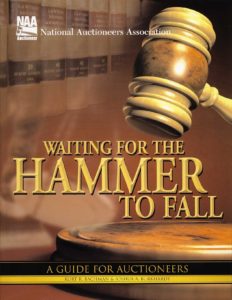BECOME AN AUCTIONEER
So you want to be an auctioneer? You’re not alone. To many, auctions are a way of life. Although most people think the rapid-fire speech of an auctioneer is their main skill, there’s much more to it than that. In fact, 98% of an auctioneer’s work has nothing to do with their “chant”. An auctioneer is involved with qualifying properties; listing; seller education & management; buyer education and registration; broker/agent education; marketing plan development and execution; event planning & set up, pick up and tear-down operations; selling; closing and finalization. If you find yourself unafraid of hard work with a desire to be rewarded based on your efforts, maybe it’s time to get your license and become an auctioneer.
Getting Started
There are two basic ways to get started on your journey to becoming an auctioneer. Your choice between the two could largely depend on the licensing requirements in your area. If you haven’t already, please reference the Auction License Laws page to help guide you in your initial decision.
There are dozens of auction schools and programs, either independent institutions or programs affiliated with a community or four-year college. Classes can last for a week or as long as a college semester. At auction school you will learn industry best practices from leading auctioneers, business professionals and public speakers. When researching schools, find a school that will invest in your success as an auctioneer. A school that is taught by qualified instructors, offers a quality education, limits the class size so that students receive one-on-one time with each instructor and provides students with tools to start their auction business after graduation are characteristics to keep in mind.
The second option is to gain practical experience as an apprentice under an experienced auctioneer. Apprentice auctioneers assist in organizing and running sales, and learn many of the crucial day-to-day operations of running an auction business. Try to find an auction company in your area that specializes in your preferred niche and is willing to work with you and your schedule.
- There are also training options available for apprentices and/or those looking to move into becoming ringmen or bid assistants. The Professional Ringmen's Institute is the only training institute in the nation dedicated totally to training and preparing individuals to serve the auction industry professionally and effectively as ringmen or bid assistants for their auction teams for any type of auction with any auctioneer.
- United Country has partnered with Professional Ringmen's Institute to offer all UC affiliates a 20% discount on tuition.
The second option is to gain practical experience as an apprentice under an experienced auctioneer. Apprentice auctioneers assist in organizing and running sales, and learn many of the crucial day-to-day operations of running an auction business. Try to find an auction company in your area that specializes in your preferred niche and is willing to work with you and your schedule.
- There are also training options available for apprentices and/or those looking to move into becoming ringmen or bid assistants. The Professional Ringmen's Institute is the only training institute in the nation dedicated totally to training and preparing individuals to serve the auction industry professionally and effectively as ringmen or bid assistants for their auction teams for any type of auction with any auctioneer.
- United Country has partnered with Professional Ringmen's Institute to offer all UC affiliates a 20% discount on tuition.
Take the Exam and Apply for Your License
The next step is many states is taking the exam and applying for your auction license. I most states, the exam is offered quarterly. Your state should have information on how to study for the test. Once you’ve passed the exam, it’s time to apply for your license. Contact your Secretary of State’s office or checking with your state Professional Licensing or Auctioneer Licensing Boards to find all the necessary information and documentation required obtain your license.
You’ve Got Your Auction License – Now What?
You may think that obtaining your license is the last part of this guide to becoming a licensed auctioneer. But what’s your next step? Believing that making it in the auction industry is easy is a common misnomer for many new auctioneers. They tend to focus on their chant or the stage but those are the final steps in the full auction process. Wanting to rush to the end of the process causes people to overlook setting a vision and strategic business plan for how to achieve their ultimate goals.
A business plan is a written description of your business’ future. It explains your goals and outlines how you plan to achieve those goals. When done properly, a business plan will provide a roadmap to success for your business. The simple act of putting pen to paper to write down your ideas and outline how the business will operate can be helpful in ensuring that you fully articulate your vision. It also helps to serve as a gauge for checking your progress as your business grows.
In most companies, business plans are used at a minimum to:
- - Set the goals and objectives for the company’s performance.
- - Provide a basis for evaluating and controlling the company’s performance.
- - Communicate a company’s message to managers, lenders, and potential hires.
When utilized most efficiently, the same business plan, with slight modification, can be used for all three actions.
This United Country Auction Services Guide to Business Planning will assist you in logically organizing and developing the contents of a well-crafted business plan. This guide presents a generalized outline for setting your personal and business goals, time prioritization, and completing your office and auctioneer business plans.
What you will need to complete your business plan:
Mission Statement:
Your mission statement should describe your or your company’s value, goals, culture and/or purpose. Answer the questions “What business are we in?” and “What is our business for?” then summarize these answers into your personalized mission statement.
Company Vision:
Your company vision should provide strategic direction and outline what you want to achieve in the next five years. Look to your mission statement as a jumping off point for your vision. Then ask yourself “What ultimate impact do I want to have on my community/industry/world?” or “In what way will I interact with clients that differentiates me from my competition?” or “What will the culture of my company look like and how will that help my clients?” Once you’ve answered these questions, you’ve created a roadmap between your present and your future, now consolidate these answers into a concise sentence or two.
Sales and Market Assessment:
You will probably find it necessary to research many areas before you have enough information to write about them, such as your assessment of the local real estate brokerage competitive landscape. Most people begin by collecting historical financial information about their company and/or industry, and completing their market research before beginning to write any part of their plan.
Budget:
Budgeting is about making an educated guess as to how the future of your business’s finances will look. It requires examining what happened last month, what happened three months ago, and what this month last year looked like—then using that information to make wise financial decisions for the months and years ahead.
Goals:
Setting SMART (specific, measureable, achievable, relevant and timely) goals can help you evaluate the goals you wish to set. Check out the Auction Prospecting Strategies page to learn more about setting SMART goals!!
Objectives/Procedures:
With your goals set, you need to form a set of procedural tasks or work assignments for each area of the plan. Procedures should include how resources will be allocated, who is in charge of accomplishing each goal, and how everything will interact.
Professional auctioneering organizations exist both on the state, provincial and national levels and are a great resource for continuing education, networking with other auctioneers and many other resources. Many organizations provide opportunities for auctioneers become certified or accredited in certain fields, further improving your credibility and professionalism.
Competition is fierce and you’ve got one chance to make a good first impression and set yourself apart from the pack. With the development of social media and an increasingly individualized society, the brand you build around yourself is perhaps the single most important way you can stand out. Your personal brand can be vital to you professionally. It is how you present yourself to current and potential clients. It gives you the opportunity to ensure that people see you in the way you want them to, instead of in some arbitrary, possibly detrimental, way. It gives you the opportunity to highlight your strengths and your passions. It helps people believe they know you better.
Check out the UC personal branding podcast episode HERE.
To Get Started
Take inventory of your skills and credentials, passions and interests and core values and beliefs. Make sure you come across as an individual with your own voice. The point is not about selling or creating an alter ego, your personal brand centers around you as an individual. It needs to be an authentic representation of who you are and amplify your beliefs and values. The secret of successful personal branding is living your brand. You are trying to establish an external depiction of “you.” This means that you need to act consistently with that depiction at all times, everywhere you go.
Next Up
Set Yourself Up On Social Media. Start off by cleaning up any risky posts that are already out there. Get rid of anything that doesn’t fit with your vision for your personal brand. Next, take some time going through your social media profiles. Make sure your bio in consistent with your personal brand, your contact info is easily found and don’t set your accounts to private. Begin interacting with users, share good press and promote your new career.
Check UC’s introduction to social media webinars HERE and HERE to get you started. When you’re done with that check out THIS podcast episode.
Work it Offline
When you leave your house and interact with people around town, make sure you keep with your brand. Talk to literally everyone. Participate in as many community and professional events as you can. Carry business cards with you and hand them out freely. Branded handouts are your friends whether it’s custom pens, koozies, or keychains, people love freebies and tend to hold on to them.
Check out the UC Company Store HERE and the Auction Store HERE for ideas.
Keep it Consistent
Clients will start recognizing your personal brand once they've encountered it several times. If you change your image mid-stream, clients will get confused, and ultimately not know (or trust) you. If you're using multiple platforms (e.g., a website and glossy color brochures), you need to keep your overall image and appearance the same. One way to accomplish this is to make sure your color schemes, logos, personal mottos, and your overview business look and feel are the same Don't make your email signature formal using a fancy script font and your stationery an architectural, linear block print—it will look too different people own your brand and your business.
Start Prospecting for Auctions
The next major step is to begin prospecting for auctions. Move to the full Auction Prospecting Strategies page to learn how!!


